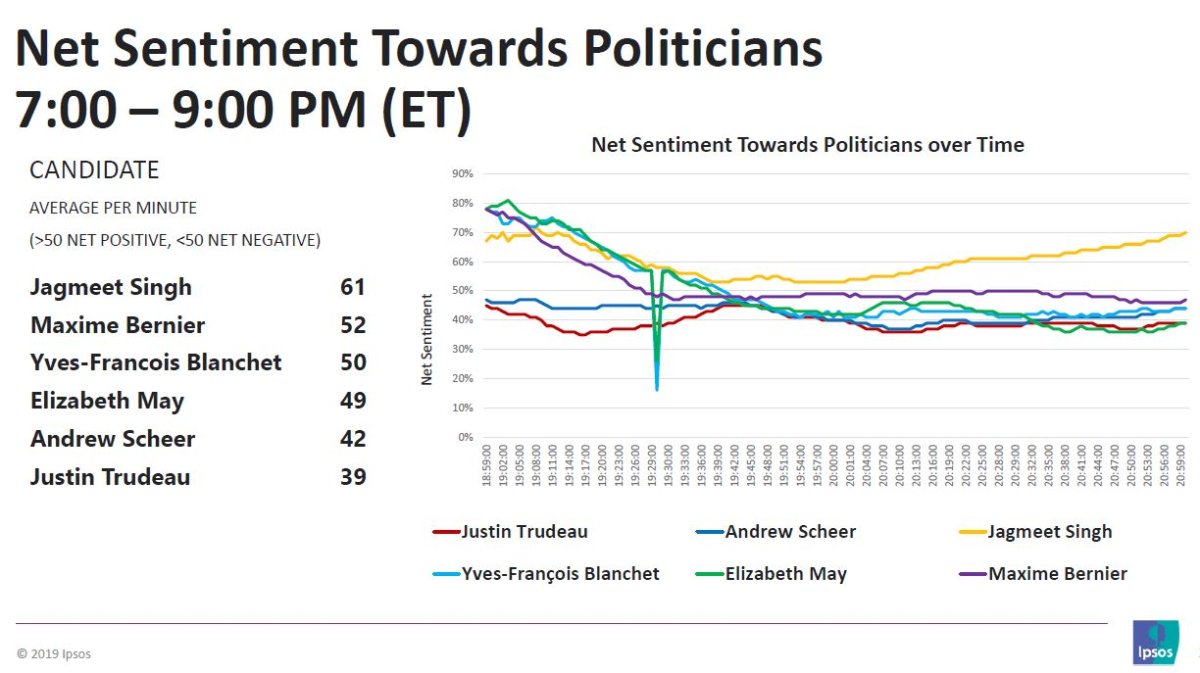Experts say Jagmeet Singh, of all the federal party leaders, came out on top after Monday’s official English-language debate, but they caution it’ll be difficult for the NDP leader to turn that momentum into votes.


Doing so would involve breaking a campaign narrative established over the last month that paints the 2019 federal election race as a neck-and-neck battle between the Liberals and the Conservatives, according to McGill professor Daniel Béland.
“The challenge is that it’s widely perceived — and it’s true — that it’s a race between two parties, and it’s also a debate about who should not be the next prime minister,” said Béland.
“The idea that it’s a race between two parties is really locked in and at this point it’s too late to change that, I think.”
Monday night’s event was the first and only English debate featuring all six federal party leaders in the 2019 election campaign.
Singh went into the evening “relatively unknown” to many of the Canadians watching and he made “an excellent first impression,” according to Anne McGrath, a longtime senior NDP staffer and now public affairs associate at Hill+Knowlton.
In what turned out to be a chaotic and time-crunched debate, experts agree Singh stood out during those two hours for his positive messaging and a few choice zingers.

Throughout the debate, Ipsos measured Twitter sentiment and volume regarding the party leaders, parties and issues exclusively for Global News.
According to the measurements of attitudes towards the leaders, Singh started strong and was the only leader to finish the night with a “net positive rating,” the results showed.
The question now is whether and how Singh can make that strong performance benefit his party — which has remained a distant third in the polls so far — in the lead up to Election Day.
A debate performance can end up meaning nothing or everything to an election campaign, according to Darrell Bricker, CEO of Ipsos Public Affairs.
“What typically happens is what we see on the debate and then what everybody says happened afterwards. And it’s the ‘what-everybody-says-afterwards’ that tends to have a bigger impact,” Bricker said. “We’ll know later in the week when we start seeing polling results coming out whether or not he’s actually moving ballots.”
Nelson Wiseman, professor of political science at the University of Toronto, said he thinks that it’s “unlikely” Singh’s performance will move the needle significantly but he likely accomplished “cementing” support among New Democrats who may have been “wavering.”
The latest Ipsos poll conducted exclusively for Global News, released on Monday, showed the NDP would receive 15 per cent of the popular vote if the election were held tomorrow, compared to the Liberals’ 35 per cent, the Conservatives’ 34 per cent and the Greens’ seven per cent.
Global News asked Singh on Tuesday whether he felt frustrated that his campaign accolades, and his message that other options exist beyond the two frontrunners, aren’t being reflected in the polls.
“I didn’t get into this because it was going to be easy,” Singh said. “I wanted to fight for people. I wanted to take on those at the very top and that’s a tough thing to do. I’m not afraid of that.”
While Singh is far behind the Liberals and Conservatives, Béland noted the NDP has pushed ahead of the Green Party in the polls in some provinces, which wasn’t the case just a month ago. Re-establishing a solid third-place standing is “an important thing” for the party, Béland argued.
“The NDP should emphasize the fact that if there’s a minority government, the NDP might have the balance of power and that’s something really important,” he said.
But, he added, “it will take quite a bit more in terms of polling numbers” for the party to move out of its current standing — especially in Quebec, where the NDP is desperately trying to hang onto its seats and faces an additional threat in the Bloc Québécois.
For his part, Bricker said he doesn’t think Singh’s performance on Monday night did anything “to a large extent” that would improve its chances in Quebec.

McGrath said Singh stands to gain from his exposure to more voters during the official debates this week, after which many families and friends will gather over the long weekend and perhaps discuss how they intend to vote over Thanksgiving dinner.
“He’s running a very positive, happy, relaxed, measured campaign and I think that he is definitely on track to be able to maintain that approach to the campaign,” McGrath said. “He is, I think, probably going to benefit from people paying more attention to him in the last couple of weeks.”
The six federal party leaders will square off for the second and last time before Election Day on Thursday. The official French-language debate will take place from 8-10 p.m. ET, also at the Canadian Museum of History in Gatineau, Que.
-With files from Mike Le Couteur and Bryan Mullan
Ipsos’ Canadian Political Atlas Debate Dashboard is an online social media monitoring tool that measured Twitter sentiment and volume through the English-language debate. The data are not representative of the Canadian population, and reflect only social media activity online. Data were collected between 7 p.m. and 9 p.m. October 7, 2019.
- Alberta to overhaul municipal rules to include sweeping new powers, municipal political parties
- Canada, U.S., U.K. lay additional sanctions on Iran over attack on Israel
- Trudeau says ‘good luck’ to Saskatchewan premier in carbon price spat
- No more ‘bonjour-hi’? Montreal mayor calls for French only greetings















Comments